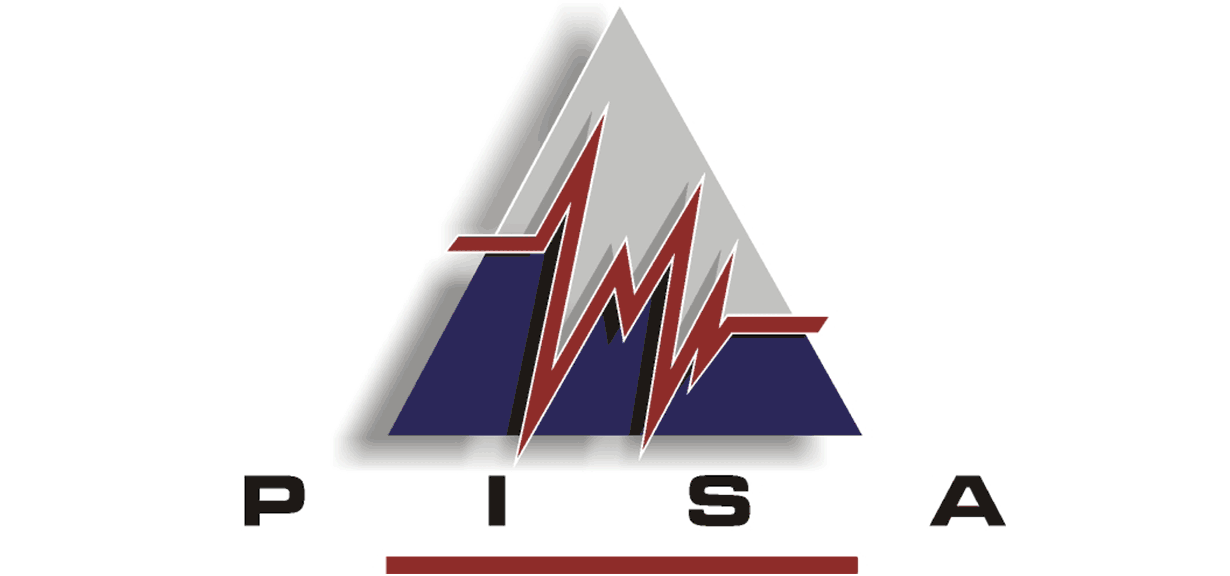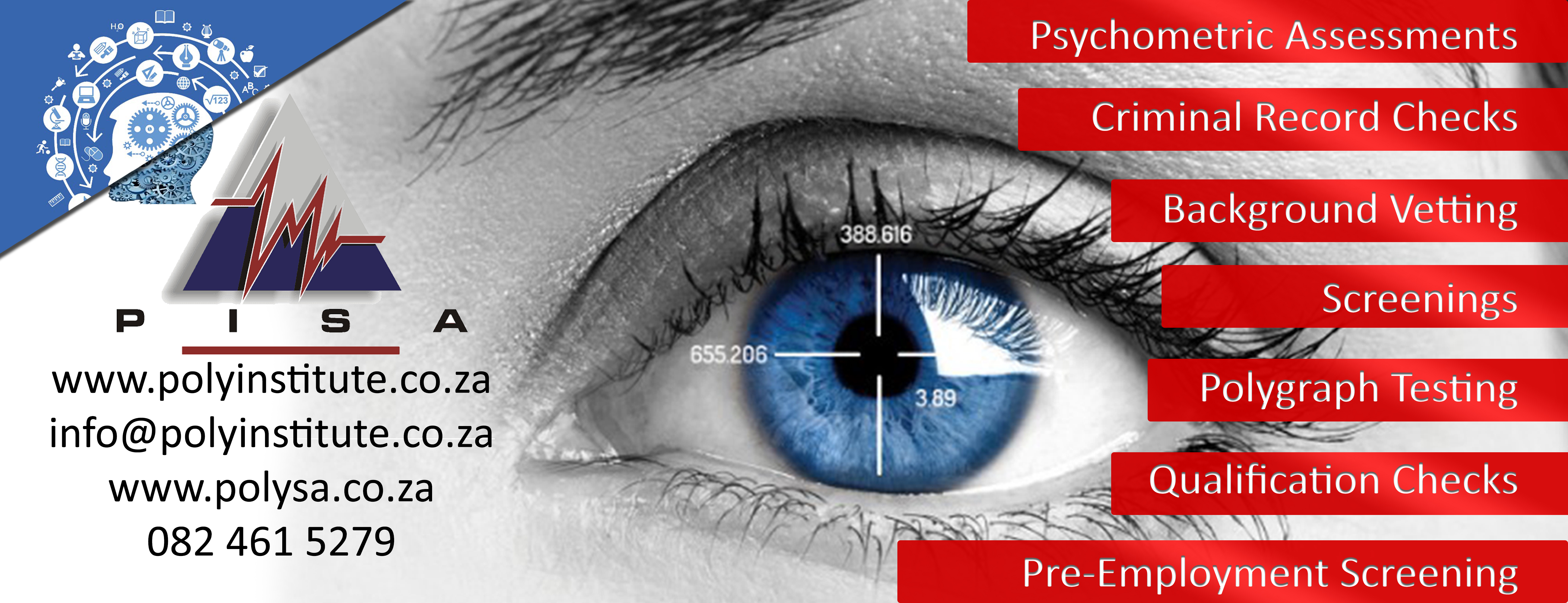Frequently Asked Questions Regarding Polygraph Examinations
When it comes to polygraph examinations and lie detector tests people are often curious, and they should be. Polygraph testing plays an increasingly large role in the world, and South Africa is no exception. Here we try to answer some of the frequently asked questions regarding polygraph examinations and other lie detection technologies. If however you have a question that is not answered in this section, please do not hesitate to send us an email and we will revert back to you with an answer as soon possible.
Would you like to contact the PISA Integrity Assessment Centre?
If you would like more information on the various division of the PISA Integrity Assessment Centre working together to provide tailor made and comprehensive solutions to our clients, please visit the respective websites:

What is the polygraph?
The polygraph is an instrument that measures some of the physiological changes that take place in the human body when a person tells a lie. It is sometimes referred to as a “lie detector”. The term “polygraph” originates from the Greek language and literally means “multi writer”.
This sets it apart from other less accurate devices that only measure one reaction, as opposed to the polygraph’s measuring of multiple reactions, allowing for proper comparison and evaluation.
A short history of the polygraph
The attempt to detect deception is as old as mankind itself. Since time immemorial, different methods have been employed to detect deception, for example pulse-taking by the Greeks in 300BC, or the swallowing of a rice cake in China in 220BC. In modern times, more scientific methods have been developed to uncover deception.
The first person to utilize an instrument for the purpose of detecting lies was C Lombroso in 1895. He measured changes in blood pressure and pulse rate with a hydrosphygmograph. J Larson (1921) was the first person to use a continuous method of recording changes in blood pressure and pulse rate and more than one recording to detect deception. In 1926, L Keeler developed a more complex recording instrument, utilising blood pressure changes, pulse rate and respiration. He added the galvanograph in 1936. The first electronic polygraph was introduced in 1974 by Stoelting Co. Today most examiners use computerised polygraph instruments.
In 1952 Reid developed an improved questioning technique by adding control questions. The first polygraph school was opened by L Keeler in 1948. In 1961, Backster developed the Zone Comparison question technique. Several studies on the polygraph have been conducted in the USA in recent years and continuous research and development is taking place in the field.
How does the polygraph work?
A polygraph instrument collects physiological data from at least three systems of the human body. Pneumograph tubes are placed over the examinee’s chest and abdominal area to record breathing patterns and finger plates are attached to the fingers to record sweat gland activity. A blood pressure cuff will record cardiovascular activity. The reactions are charted by the polygraph instrument and reflected on charts printed from the recordings.
When a person answers questions during a polygraph examinations the examiner will monitor for a set of physiological reactions which have been correlated to the act of being deceptive on a statistically significant level. These changes can thus accurately indicate whether a person is being truthful or not.
Procedures followed during an examination
A typical polygraph examination will include periods referred to as a pre-test phase, a chart collection phase, post- test phase and a test analysis phase. This procedure usually takes one to one and a half hours.
- In the pre-test phase, the polygraph examiner will complete required paperwork and explain the theory of the polygraph in an understandable way to the examinee. The examinees will be given the opportunity to discuss their roles or perceptions regarding the case under investigation and provide relevant information. During this period, the examiner will discuss the questions to be asked and familiarise the examinee with the testing procedure.
- During the chart collection phase, the examiner will administer the examination and collect a number of polygraph charts. No questions will be asked during the examination that have not been discussed and reviewed with the examinee.
- In the post-test phase, the examiner will analyse the charts and render an opinion as to the truthfulness of the person taking the test. The examiner, when appropriate, will offer the examinee an opportunity to explain physiological responses in relation to any questions asked during the examination.
Accuracy of polygraph results
During the past 75 years, over 250 different studies have been conducted in this regard. The preponderance of available information indicates the polygraph technique to be reliable in as much as 85% to 98% of specific issue investigations. This proves the polygraph to be more reliable than most, if not all other conventional methods of investigation.
Continuous research is conducted regarding polygraph examinations including an in depth statistical analysis conducted by Dr Nelson and his team and multiple independent institutions. Even to date polygraph examinations are considered the most accurate means for the detection of deception.
Can a person be compelled to take a polygraph examination?
Unless contracted as such, no person can be compelled to undergo a polygraph examination. This is in keeping with section 35 of the South African Constitution and also the Criminal Procedure Act.
Does nervousness affect the examination results?
The polygraph technique allows for the level of a person’s general nervous tension. Most individuals will be nervous before and during a polygraph examination. However, this only affects the level from which recordings are made and does not affect the result of the examination, i.e. although the level of nervousness will affect the individual’s physiological baseline, it will not affect the variations on the baseline and consequently the result of the examination.
Areas that would not be inquired into during a polygraph examination?
No examiner of the PISA Integrity Assessment Centre or Polygraph Institute of South Africa will ask questions about any of the following areas during an examination:
- religious beliefs or affiliations
- beliefs or opinions regarding racial matters
- political beliefs or affiliations
- beliefs, affiliations or lawful activities regarding unions or labour organisations
- sexual preferences or activities
Substantiating truthfulness by taking a polygraph examination
It often happens that individuals are unfortunately or unjustly implicated in a crime or marked as targets for accusations or inferences. In many cases, there is no way in which those concerned can restore the trust or protect their reputation from the harm of careless accusations. The polygraph examination provides an excellent opportunity to restore the trust between employee and employer and creates an unequaled opportunity for such individuals to substantiate their truthfulness and prove their innocence.
Investigative agencies make use of the polygraph
These agencies have found that the polygraph can be used most effectively to limit the number of suspects. The results normally indicate which person or persons were involved in the matter under investigation, and in some instances admissions of guilt are obtained during or after a polygraph examination. It must be stressed however, that the polygraph does not replace an investigation.
The polygraph is a valuable aid in an investigation, and can add valuable information to the investigation. The polygraph helps to focus the investigation, thus saving time, manpower and money. It also helps to establish the bona fides of honest persons implicated in a case quickly and efficiently.
The polygraph can help businessmen or managers
The polygraph helps to provide information regarding the integrity of workers quickly and accurately. It can therefore be of great value in the appointment of personnel, as well as in establishing culpability in cases of employee theft or fraud. The polygraph is an invaluable aid in any personnel integrity maintenance program.
Confidentiality of polygraph examinations
Every effort is made to ensure the privacy and security of an examinee or client’s information. All files are restricted to those immediately involved in the procedure. The results of an examination or even the fact that an examination was conducted is carefully guarded information. Only the individual sponsoring the examination (and others as may be required by due process of law) is entitled to the facts concerning the results.
Selecting a polygraph examiner
When a client chooses an examiner, it is very important to ensure that the individual is fully qualified from an accredited polygraph school and is a member of the Southern African Polygraph Federation (SAPFED). Only reputable polygraph companies with a proven track record should be considered.
How Can We Help You?
Do not hesitate to contact the PISA Integrity Assessment Centre and let our years of experience work for you. Whether you would like to make a booking, ask for a consultation or would like more information on how our multitude of products and service can benefit your business, we are ready and eager to assist in any way we can.
Would you like to contact us for a booking or consultation?
Would you like to know more about our products and services?
Would you like to know more about the company?
Would you like to know more about polygraph examinations and the law in South Africa?
Download the PISA Integrity Assessment Centre A4 advert: Download
Download the PISA Integrity Assessment Centre small advert: Download
Download the PISA Integrity Assessment Centre Tri-Fold Flyer: Download

For more information specifically related to polygraph examinations, please visit The Polygraph Institute of South Africa.
For more information specifically related to pre-employment screenings, please visit the Pre-Employment Screening Centre.
For more information specifically related to our psychometric assessments, please visit the PISA Psychometric Assessment Centre.



You must be logged in to post a comment.